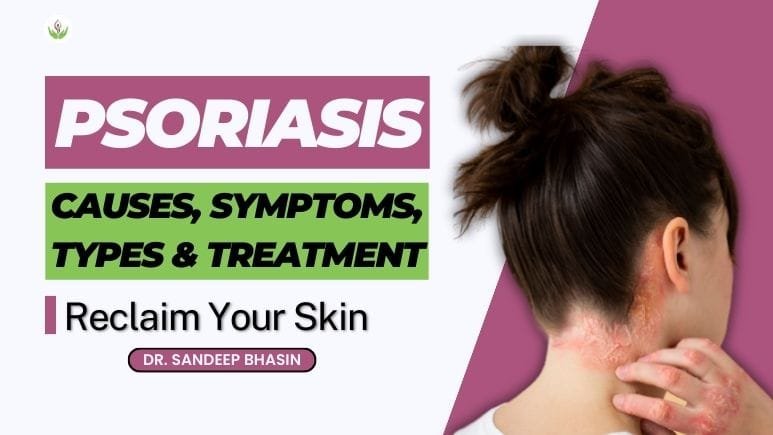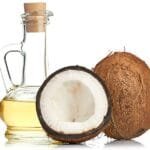Introduction
Psoriasis is a skin condition that results in scaly patches and rashes with an itch. It is most commonly caused on the elbows, scalp, knees, and trunk. It is a commonly found, chronic condition with no remedy. It can make it difficult for the patient to concentrate, sleep properly, and cause pain. Psoriasis typically goes through rotations, flaring for some months or weeks and then subsiding for a while.
Individuals with a genetic tendency for Psoriasis can often experience flare-ups triggered by common factors such as infections, burns or cuts, and specific medications. However, there are treatment options available to manage the symptoms well. You can help yourself with coping strategies and treatments to easily manage your symptoms and lead a better life with Psoriasis.
What is Psoriasis?
Psoriasis is a skin problem where your skin gets red, swollen, and covered with thick, scaly patches called plaques. It’s a long-term condition that can happen suddenly and not completely cured. It is an autoimmune condition that causes inflammation of the skin.
It occurs due to accelerated skin cell turnover, resulting in thick scales. Psoriasis can appear as widespread or localized patches on the body, scalp, nails, or joints. While the exact cause is unknown, an overactive immune response targeting healthy skin cells is believed to be involved.
What are the causes of Psoriasis?
Psoriasis is caused by an over-reactive immune system that causes inflammation in the skin. If you have psoriasis, your immune system should destroy foreign invaders like bacteria to keep your body healthy and prevent you from getting ill.
Instead of this, your immune system, in this condition, often mistakes healthy cells for foreign invaders. Your immune system causes swelling or inflammation visible on your skin’s surface, known as skin plaques.
It typically takes around 30 days for the new skin cells to evolve and replace the old cells of the skin. Your overreactive immune system alters the timeline of new cell formation to a timeline of three to four days.
When you have psoriasis, the cells in your skin grow too quickly, causing scales to form and your skin to shed more often. This can happen on top of the plaques on your skin. Psoriasis can also be passed down from parents to their children, suggesting that a genetic factor is involved in the condition’s development.
What causes psoriasis outbreaks?
When a person with Psoriasis experiences an outbreak or flare-up, they develop symptoms of the condition due to coming into contact with a trigger. These triggers can be irritants or allergens that provoke psoriasis symptoms. Psoriasis outbreaks differ from one person to another. Some of the most common triggers for psoriasis flare-ups include the following:
- Emotional stress.
- Infections, such as streptococcal infection.
- Skin injuries like cuts, surgery, sunburns, or scrapes.
- Excessive alcohol consumption.
- Certain medications like beta-blockers and lithium.
- Changes in body temperature due to extreme weather situations like dry and cold conditions.
- Smoking and being around secondhand smoke can also act as triggers.
- Certain medications include lithium, high blood pressure, and antimalarial drugs.
- Abrupt discontinuation of oral or injected corticosteroids.
Types of Psoriasis
Understanding your psoriasis type is important for creating a treatment plan with your doctor. Typically, people experience one type of psoriasis at a time. However, a new form of psoriasis may occasionally appear in response to a trigger, even after your symptoms have improved. Here are the different types of psoriasis, ways to spot them, and the appropriate treatments.
Plaque Psoriasis
Plaque psoriasis is the most commonly found psoriasis. It causes itchy, dry, and raised plaques or skin patches covered with greyish scales. There can be many or few such patches. They are typically found on the scalp, elbows, knees, and lower back. The color of the patches may differ in color, based on the skin color. As the psoriasis-affected skin heals, it occasionally changes color. This is called post-inflammatory hyperpigmentation, and it can be more noticeable in black or brown-colored skin.
Plaque Psoriasis Symptoms:
Plaque psoriasis causes inflamed, raised, and red skin covered with shite, silvery scales. However, the patchy skin may appear to be purplish with grey-colored scales on darker skin colors. It may appear anywhere on the skin, but typically it appears in the following parts of the body:
- Knees
- Lower back
- Scalp
- Elbows
Nail Psoriasis
Psoriasis can harm nails, leading to pitting, and unusual discoloration of the nails and their growth. Nails affected by psoriasis may become loose and detach from the nail bed, a condition known as onycholysis. In severe cases, the nails can even crumble. Individuals with psoriatic arthritis, which impacts joints, are more likely to experience nail psoriasis, a prevalent occurrence.
Nail Psoriasis Symptoms:
- Painful and tender nails
- Pitting of nails
- Change in color varying from yellow to brown
- Nail separation from the bed
- Formation of chalklike material under the nails
You are also likely to contract a fungal infection.
Guttate Psoriasis
It majorly affects kids and young-aged adults. A bacterial infection like strep throat typically triggers it. It is marked by drop-shaped, small, scale spots on the limbs or trunk. It might be around 8% of psoriasis cases. In certain instances, this type of psoriasis may resolve itself within a few weeks, even without any treatment. However, some cases can be more persistent and need treatment.
Guttate Psoriasis Symptoms:
- Itching
- Pinkish-red skin spots that may look like teardrops
- Spots may be covered with scales
Inverse Psoriasis
It typically affects the folds of skin in areas like the groin, breasts, and buttocks. It results in smooth, red patches of skin that become more irritated with sweating and rubbing. Fungal infections can also cause inverse psoriasis.
Inverse Psoriasis Symptoms:
- Getting worse due to rubbing and sweating.
- Patches of the skin that are smooth, red, and shiny.
- They do not have scales.
Pustular Psoriasis
It is a rare type that causes blisters filled with pus. These blisters can appear in clearly defined patches all over the body or on small areas, specifically on the soles of the feet or the palms.
Pustular Psoriasis Symptoms
- Chills
- Fever
- Fast heart rate
- Muscle weakness
- Nausea
Erythrodermic Psoriasis
Erythrodermic psoriasis is rare psoriasis that may cover your entire body with a peeling rash. This rash can burn or itch intensely. This psoriasis can be either chronic (long-term) or acute (short-lived).
Erythrodermic Psoriasis Symptoms:
- Severe burning, itching, or peeling
- Rapid heart rate
- Alterations in body temperature
If you suffer from such symptoms, you must visit a physician immediately. It may call for you to be admitted to a hospital for treatment. This psoriasis type can lead to serious illness due to the loss of fluids and protein from the body. It can also increase the risk of infection, pneumonia, or congestive heart failure.
Sebopsoriasis
This type of psoriasis usually appears on your face and scalp as patches and bumps covered in a yellowish, greasy scale. It’s a combination of seborrheic dermatitis and psoriasis.
Sebopsoriasis Symptoms
- Scaly skin
- Hair loss
- Highly greased skin
- Itchiness
- Plaques
- Redness of skin
Psoriasis Treatment
The goal of psoriasis treatments is to delay the rapid growth of cells in the skin and eliminate scales. Some treatment options include ointments and creams (topical therapy), injected or oral medication, and light therapy. The preference for treatments for psoriasis depends on the severity of the condition and its response to previous treatments and self-care processes. Exploring different medications or treatments may be necessary until an effective approach is found. It’s important to note that psoriasis often tends to recur despite fruitful treatment.
Topical Therapy
Vitamin D analogs – Various synthetic forms of vitamin D, like calcitriol (Vectical) and calcipotriene (Dovonex, Sorilux), slower cell growth in the skin. This kind of drug may either be used alone or along with topical corticosteroids. Calcitriol is known to cause minor irritation in sensitive places compared to other treatments. However, it’s worth noting that calcipotriene and calcitriol are generally pricier than topical corticosteroids.
- Corticosteroids – Corticosteroids are the commonly prescribed medication for treating moderate to mild psoriasis. These are present in the market as ointments, oils, lotions, creams, moisturizers, foams, shampoos, and sprays. For delicate areas like the folds of the skin, and face and for curing large affected areas, mild corticosteroid ointments (such as hydrocortisone) are often suggested. During flare-ups, topical corticosteroids must be applied once daily, while during periods of remission, they may be used on weekends or alternate days. Your doctor may provide stronger corticosteroid ointment or cream – clobetasol (Temovate, Cormax, etc.) or triamcinolone (Trianex) – for small, tough-to-treat, less-sensitive parts. Long-term usage of powerful corticosteroids leads to skin thinning. In addition, eventually, topical corticosteroids might stop showing results.
- Retinoids – Tazarotene, which comes in a cream or gel form like Tazorac or Avage, can be applied a couple of times a day. The main side effects include irritation of the skin and heightened light sensitivity. It’s important to note that Tazarotene is not recommended if you are pregnant, breastfeeding, or planning pregnancy.
- Salicylic acid – Shampoos and scalp solutions containing salicylic acid help reduce scaling caused by scalp psoriasis. These products are available in both nonprescription and prescription strengths. They can be used on their own or in combination with other topical treatments to enhance the absorption of medication by the scalp.
- Calcineurin inhibitors – Calcineurin inhibitors like pimecrolimus (Elidel) and tacrolimus (Protopic) soothe rashes and reduce scaling. They are particularly useful for sensitive areas like the eyes, where retinoids or steroid creams can be harmful. However, these inhibitors are not recommended during pregnancy, breastfeeding, or if you intend to plan a pregnancy. Additionally, they should not be used for extended periods due to a potentially higher risk of lymphoma or skin cancer.
- Anthralin – Anthralin is a cream containing tar that works by slowing down the growth of skin cells. It is effective in removing scales and promoting smoother skin. However, it should not be used on the genitals or your face. It’s important to note that anthralin can cause skin irritation and tends to stain nearly anything it comes into contact with. Typically, it is applied for a brief period and then rinsed off.
Light therapy
Light therapy, either on its own or combined with medications, is a primary treatment for medium to extreme psoriasis. It involves controlled exposure of the skin to artificial and natural light. Multiple sessions are typically required. Consult with your healthcare provider to determine if phototherapy at home is an option for you.
- Sunlight: Daily exposure to sunlight in mild quantities (heliotherapy) can potentially improve psoriasis. Consult with your healthcare provider for guidance on safely using natural light treatment.
- Goeckerman Therapy: This treatment combines light therapy with coal tar, enhancing the skin’s response to UVB light and increasing effectiveness.
- UVB Broadband: Expert-managed doses of UVB broadband rays from an artificial source can cure various forms of psoriasis. Potential short-lived side effects include itchy, inflamed, and dry skin.
- UVB Narrowband: Narrowband UVB light therapy is often more productive than broadband treatment. It is administered twice or thrice weekly initially, followed by less frequently for maintaining it. However, it may pose more severe damage than UVB broadband.
- Psoralen plus Ultraviolet A (PUVA): It incorporates taking a light-sensitizing medication named Psoralen before exposing the affected part to Ultra Violet A light. It is commonly used for severe psoriasis but has potential side effects such as nausea, headache, and increased skin sensitivity.
- Excimer Laser: In this targeted light therapy treatment, a strong Ultra Violet B light is directed only at the affected skin. It typically requires less number of sessions than traditional phototherapy but may lead to blistering and inflammation.
Oral or injected medications
If you are suffering from moderate to severe psoriasis or other ineffective treatments, your healthcare provider might recommend injected or oral (systemic) medications. These medications are sometimes used for short durations and may be used as an alternative to other treatments due to their potential for serious side effects.
- Retinoids – Acitretin, along with various other retinoids, are oral medications that help reduce skin cell production. Possible side effects may include itchiness and dryness of the skin. It is important to note that these medications are not prescribed during pregnancy, breastfeeding, or if you are planning a pregnancy.
- Biologics – These are typically given by injection, modify immunity to disrupt the sickness cycle, and improve psoriasis symptoms within weeks. They are used for moderate to extreme psoriasis when other treatments are ineffective. Three of these drugs (ustekinumab, etanercept, and ixekizumab,) are prescribed for use in children. However, these medications can be costly, and their coverage under health insurance policies may vary. One must use biologics with caution as they risk suppressing immunity in ways that lead to an increased chance of serious infections.Biological drug options include:
- apremilast (Otezla)
- certolizumab (Cimzia)
- infliximab (Remicade)
- adalimumab (Humira)
- secukinumab (Cosentyx)
- ustekinumab (Stelara)
- ixekizumab (Taltz)
- guselkumab (Tremfya)
- etanercept (Enbrel)
- tildrakizumab (Ilumya)
- Methotrexate – Methotrexate (Trexall) is an oral medication taken once a week. It reduces skin cell production and inflammation but is less effective than infliximab and adalimumab. Side effects may include loss of appetite, an upset stomach, and tiredness. Long-term users of methotrexate require regular blood counts and liver function tests. Individuals planning to conceive should stop taking methotrexate three months prior, and it is barred for breastfeeding mothers.
- Steroids – Steroids, such as triamcinolone, can be directly injected into persistent, small psoriasis patches as a treatment option recommended by your healthcare provider.
- Cyclosporine – Cyclosporine (Neoral, Gengraf, Sandimmune) is an oral medication used for extreme psoriasis as it weakens immunity. It is similarly effective to methotrexate but cannot be continuously used for more than a year. However, like other immunosuppressants, cyclosporine raises the risk of other health problems and infections, including cancer. Long-term users of cyclosporine require regular monitoring of kidney function and blood pressure. It is not recommended during pregnancy, breastfeeding, or if planning for pregnancy.
Why choose Care Well Medical Center for Psoriasis treatment?
CWMC is a pioneering clinic in psoriasis treatment, taking a holistic and integrated approach. Recognizing the multifactorial nature of psoriasis, CWMC considers immune dysfunction, genetics, and lifestyle factors in its treatment approach.
Dr. Sandeep Bhasin utilizes rare and cutting-edge treatments, including advanced biologic therapies, personalized dietary plans, and stress management techniques. By addressing every aspect of the patient’s well-being, CWMC offers a unique and effective healing experience. They stand out as one of the few clinics utilizing innovative and rare forms of treatment for psoriasis. Dr. Sandeep Bhasin’s approach to psoriasis treatment is characterized by rare, unconventional, and highly effective methods, which include the following:
High-dose Vitamin D Treatment
High-dose vitamin D treatment is a newly explored potential treatment option for managing psoriasis. Vitamin D modulates the immune system and promotes healthy skin cell growth, making it a target for psoriasis treatment. However, it’s important to note that the effectiveness of high-dose vitamin D treatment for psoriasis is still a subject of ongoing research, and its use should be discussed with a healthcare professional.
Some studies have suggested that high-dose vitamin D supplementation may benefit psoriasis symptoms. The rationale behind this approach is that psoriasis patients often have lower vitamin D levels, and correcting this deficiency may help alleviate the condition. High-dose vitamin D treatment typically involves taking oral vitamin D supplements in much higher doses than the recommended daily allowance. However, it is crucial to approach high-dose vitamin D treatment with caution. Vitamin D toxicity can occur with excessive intake, leading to hypercalcemia (heightened calcium levels) and other potential health risks.
It’s worth noting that the efficacy of high-dose vitamin D treatment for psoriasis varies among individuals. While some may experience improvement in symptoms, others may not respond as effectively. Psoriasis is a complex condition, and its management often requires a multifaceted approach, including medications, lifestyle modifications, and other treatment options.
Ozone Therapy
Ozone therapy has been explored as an alternative treatment for psoriasis. Ozone therapy involves the administration of ozone gas to the body through various methods. Proponents of ozone therapy for psoriasis suggest that ozone’s potential anti-inflammatory and immune-modulating properties may help alleviate psoriasis symptoms. It is believed to work by increasing oxygen delivery to tissues, enhancing circulation, and activating antioxidant mechanisms in the body.
Medical Cannabis
Medical cannabis has gained attention as a potential treatment option for various medical conditions, including psoriasis. Cannabis contains compounds called cannabinoids, such as THC (tetrahydrocannabinol) and CBD (cannabidiol), which interact with the body’s endocannabinoid system and have potential therapeutic effects.
Some studies and anecdotal evidence suggest that cannabinoids may possess anti-inflammatory and immunomodulatory properties, which could potentially help alleviate symptoms of psoriasis. These properties may reduce inflammation, itching, and scaling associated with the condition. Additionally, cannabinoids may have analgesic properties that could relieve psoriasis-related pain.
The use of medical cannabis should be approached with caution and under the guidance of a healthcare professional. The dosage, strain, and mode of administration of medical cannabis should be carefully considered, as individual responses may vary, and side effects are possible. It is crucial to consult with a qualified healthcare provider who can evaluate your condition, discuss potential risks and benefits, and guide you on incorporating medical cannabis into your psoriasis treatment plan if deemed appropriate.
High-dose Vitamins
High-dose vitamins are yet another potential treatment choice for psoriasis. Vitamins, such as vitamin B12, vitamin D, and vitamin E, play important roles in immune function and skin health, making them of interest in psoriasis management.
For instance, high-dose vitamin D treatment has been investigated due to its potential anti-inflammatory effects and role in regulating skin cell growth. Some studies suggest correcting vitamin D deficiency through high-dose supplementation may help reduce psoriasis symptoms.
Similarly, vitamin B12 deficiency has been associated with an increased risk and severity of psoriasis. High-dose vitamin B12 supplementation may be considered for individuals with confirmed deficiencies to alleviate symptoms. Vitamin E, known for its antioxidant properties, has also been studied in psoriasis. While evidence supporting its use is limited, it contributes to overall skin health and may provide some benefits.
High-dose vitamin supplementation should be undertaken under the guidance of a healthcare professional to ensure appropriate dosing and monitoring. It is essential to consult with a healthcare provider to evaluate your specific needs and determine if high-dose vitamin supplementation is suitable as part of your psoriasis treatment plan. They can assess your nutritional status, guide you on proper dosing, and monitor your progress for optimal outcomes.
Diet Management In Psoriasis
Diet management can play a supportive part in managing psoriasis symptoms. However, it is important to note that diet alone cannot cure or eliminate psoriasis. Here are some dietary considerations that may help manage psoriasis:
- Anti-inflammatory diet: Incorporating anti-inflammatory foods can help reduce psoriasis-related inflammation. These include omega-3 fatty acid-rich foods (like flaxseeds, fatty fish, and chia seeds), colorful fruits and vegetables, legumes, whole grains, and healthy fats (such as avocados and olive oil).
- Gluten-free diet: Some individuals with psoriasis may have an associated celiac disease or gluten sensitivity. Adopting a gluten-free diet may be beneficial. Gluten is found in wheat, rye, barley, and connected products.
- Avoid trigger foods: Certain foods may exacerbate psoriasis symptoms in some individuals. Common triggers include alcohol, processed foods, sugary snacks, and foods high in saturated fats. Keeping a food diary to identify any specific triggers for your condition can be helpful.
- Weight management: Maintaining a healthy weight helps manage psoriasis. Obesity worsens inflammation and symptoms. A balanced diet and exercise promote weight management.
- Stay hydrated: Drinking adequate water helps keep the skin hydrated and may support overall skin health.
Remember, dietary changes should be part of a comprehensive approach to psoriasis management and should be discussed with a healthcare professional to ensure they are appropriate and tailored to your specific needs.
Conclusion
Experience unconventional treatments at CWMC: high-dose Vitamin D, ozone therapy, and medical cannabis. Vitamin D boosts the immune system and skin cell growth. Ozone therapy reduces inflammation and modulates immunity.
Medical cannabis offers anti-inflammatory, immunomodulatory, and analgesic effects for psoriasis relief. High-dose vitamins B12, D, and E are studied for psoriasis management. Manage psoriasis with diet, weight, and hydration. Consult a healthcare professional for proper treatment and diet guidance.














